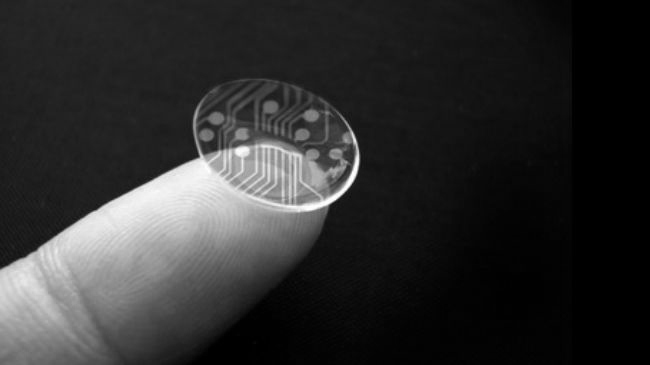Innovega releases iOptik contact lenses rivaling Google Glass
One of the most recent so-called “smart” products entering the market, iOptik contact lenses are the newest variation on personal virtual technology. Invented by the company Innovega, these contact lenses allow users to see a translucent screen appear before their eyes, navigating them through the World Wide Web.
The product is turning heads in media largely due to its resemblance to Google Glass, which allows users to take photos, tell time, and search the web, all with the prompt “OK Glass.” According to Innovega’s introductory video, the contact lenses can be used to receive additional information about the user’s surroundings or overlay translucent images or video clips.
The rival goods compete for the consumer market in matters of convenience, safety, and design. Some students cited the unusual design of Google Glass as the reason they would prefer iOptik contact lenses. While both have similar functions, Innovega boasts its ability to give the viewer information on his or her surroundings, identifying and labeling nearby places.
“I would probably use the contact lenses as long as they have my power. I feel like the contact lenses would be more ideal for me as opposed to Google Glass, which just seems unwieldy on the face,” Sanjana Kaundinya (11) said. Prescription iOptik contact lenses are expected to join the market as well.
Others felt that they would rather avoid the contact lenses for safety and comfort.
“I think I‘d choose Google Glass instead because I doubt if the contact lenses would be comfortable, and I can’t take them off whenever I want,” Sandra Yin (12) said. “I think it will be popular for a period of time because of curiosity, but later on, it depends on how useful it is.”
Students expect the eyewear to cause controversy about over-dependence on technology. While many dismissed this concern, a few supported the position whole-heartedly.
“I’ve never been that big of a fan of the Google Glass idea, just because it seems kind of creepy and intrusive, so the fact that you can put this in your eye and nobody can even see it […] it’s even more intrusive because nobody knows if they’re being watched,” Andrew Rule (9) said. “I’m not so dependent on technology; that’s kind of one of my philosophies. This seems like it would contribute to [over-dependence] even more, because we’re already going that direction.”
The technology first premiered at the 2014 Consumer Electronics Show in Las Vegas from Jan. 7 to 10. Also debuting at the convention were an array of different smartwatches, a “smart” adaptor for classic television sets, and an app that allows users to cook from their smartphones.
The contact lenses interact with Innovega’s HD glasses to help focus images, and will be released in the market at an undisclosed date. According to Innovega, both the lenses and the glasses are necessary to obtain a sharp image.
This piece was originally published in the pages of the Winged Post on Jan. 27, 2014.
Vasudha Rengarajan is the Editor-in-Chief of Harker Aquila. As former Features editor and Sports editor for Aquila and a reporter for The Winged Post,...


















![“[Building nerf blasters] became this outlet of creativity for me that hasn't been matched by anything else. The process [of] making a build complete to your desire is such a painstakingly difficult process, but I've had to learn from [the skills needed from] soldering to proper painting. There's so many different options for everything, if you think about it, it exists. The best part is [that] if it doesn't exist, you can build it yourself," Ishaan Parate said.](https://harkeraquila.com/wp-content/uploads/2022/08/DSC_8149-900x604.jpg)




![“When I came into high school, I was ready to be a follower. But DECA was a game changer for me. It helped me overcome my fear of public speaking, and it's played such a major role in who I've become today. To be able to successfully lead a chapter of 150 students, an officer team and be one of the upperclassmen I once really admired is something I'm [really] proud of,” Anvitha Tummala ('21) said.](https://harkeraquila.com/wp-content/uploads/2021/07/Screen-Shot-2021-07-25-at-9.50.05-AM-900x594.png)







![“I think getting up in the morning and having a sense of purpose [is exciting]. I think without a certain amount of drive, life is kind of obsolete and mundane, and I think having that every single day is what makes each day unique and kind of makes life exciting,” Neymika Jain (12) said.](https://harkeraquila.com/wp-content/uploads/2017/06/Screen-Shot-2017-06-03-at-4.54.16-PM.png)








![“My slogan is ‘slow feet, don’t eat, and I’m hungry.’ You need to run fast to get where you are–you aren't going to get those championships if you aren't fast,” Angel Cervantes (12) said. “I want to do well in school on my tests and in track and win championships for my team. I live by that, [and] I can do that anywhere: in the classroom or on the field.”](https://harkeraquila.com/wp-content/uploads/2018/06/DSC5146-900x601.jpg)
![“[Volleyball has] taught me how to fall correctly, and another thing it taught is that you don’t have to be the best at something to be good at it. If you just hit the ball in a smart way, then it still scores points and you’re good at it. You could be a background player and still make a much bigger impact on the team than you would think,” Anya Gert (’20) said.](https://harkeraquila.com/wp-content/uploads/2020/06/AnnaGert_JinTuan_HoHPhotoEdited-600x900.jpeg)

![“I'm not nearly there yet, but [my confidence has] definitely been getting better since I was pretty shy and timid coming into Harker my freshman year. I know that there's a lot of people that are really confident in what they do, and I really admire them. Everyone's so driven and that has really pushed me to kind of try to find my own place in high school and be more confident,” Alyssa Huang (’20) said.](https://harkeraquila.com/wp-content/uploads/2020/06/AlyssaHuang_EmilyChen_HoHPhoto-900x749.jpeg)



